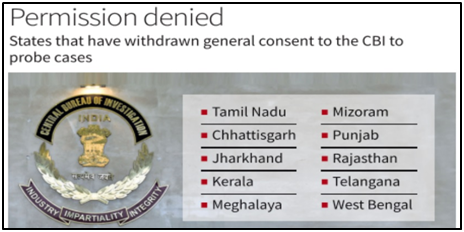Why in News?
- The Tamil Nadu government has withdrawn general consent accorded to the Central Bureau of Investigation (CBI) to investigate cases in the state.
- This comes at a time when a state cabinet minister is facing heat from the Enforcement Directorate over his alleged role in a job racket scandal.
What’s in Today’s Article?
- About CBI
- “Consent” Required by the CBI for Conducting Investigation in a State
- Withdrawal of General Consent and its Impact
About the Central Bureau of Investigation (CBI):
- The CBI is the premier investigating agency of India operating under the jurisdiction of the Ministry of Personnel, Public Grievances and Pensions, Government of India.
- It traces its origin from the Delhi Special Police Establishment (DPSE) Act, 1946, which regulates the CBI.
- As the DPSE Act is not passed by Parliament of India, CBI is created by an executive order of the government, hence not a statutory body yet and is exempted from the purview of the Right to Information (RTI) Act.
- Originally set up to probe cases of corruption in the government departments, CBI’s jurisdiction expanded to include several economic crimes, special crimes, cases of corruption and other cases.
- Investigating powers of CBI are divided into:
- Anti-Corruption Division: It investigates cases against central government employees, public servants working under state governments (entrusted to the CBI by the state).
- The Economic Offences Division: It investigates financial crimes, bank frauds, money laundering, illegal money market operations, graft in PSUs and banks.
- The Special Crimes Division: It handles cases of conventional nature such as offences relating to internal security, espionage, narcotics and psychotropic substances, etc.
“Consent” Required by the CBI for Conducting Investigation in a State:
- Legal basis: Section 6 of the DPSE Act authorises the central government to direct CBI to probe a case within the jurisdiction of any state but only with the consent of the concerned state government.
- However, the SC and HCs can order CBI to investigate such a crime anywhere in the country without the consent of the state.
- Types of consent:
- General consent: When a state gives a general consent to the CBI for probing a case, the agency is not required to seek fresh permission every time it enters that state in connection with investigation or for every case.
- It is normally given by states to help the CBI in the seamless investigation of corruption cases against central government employees in their states.
- Specific consent: When a general consent is withdrawn, CBI needs to seek case-wise (specific) consent for investigation from the concerned state government.
- If specific consent is not granted, the CBI officials will not have the power of police personnel when they enter that state, preventing the CBI from conducting a thorough inquiry.
- States which have withdrawn general consent so far
- General consent: When a state gives a general consent to the CBI for probing a case, the agency is not required to seek fresh permission every time it enters that state in connection with investigation or for every case.
Withdrawal of General Consent and its Impact:
- The withdrawal of general consent does not stop CBI probes in all cases.
- The CBI continues to probe in old cases until specifically taken back by the state government.
- Further, it continues to investigate cases that were given to it by a court order.
- The CBI can also challenge the decision (of withdrawal of general consent) in a court showcasing its progress of investigation in the case.
- When the CBI does not have a general consent, it can approach a local court (as per a provision in theCrPC) for a search warrant and conduct investigation.





